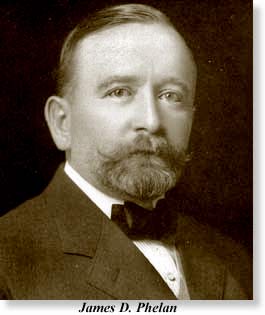|
||||
|
||||
|
|||||||||||||||||||
 "The Ideal San Francisco," by James D. Phelan - 1897
"The Ideal San Francisco," by James D. Phelan - 1897
"The Situation in San Francisco," by James D. Phelan - 1906 "Rejoices at the Fall of Schmitz in 'Frisco" - 1906 Phelan Leads Move to Relocate Chinatown - 1906 Sen. Phelan Attacks Prohibition - 1929 Phelan's Home at Villa Montalvo |
 James Duval Phelan was born in San Francisco, April 20, 1861. He was
educated at St. Ignatius High School and graduated with an A.B. degree from
the University of San Francisco in 1881, followed by a law degree from the
University of California. However, he did not pursue a law career, but
became a partner in the banking firm Phelan & Son, assuming responsibility
of the First National Bank, the Mutual Savings Bank, and the Bank of Santa
Cruz County upon the death of his father in 1892.
James Duval Phelan was born in San Francisco, April 20, 1861. He was
educated at St. Ignatius High School and graduated with an A.B. degree from
the University of San Francisco in 1881, followed by a law degree from the
University of California. However, he did not pursue a law career, but
became a partner in the banking firm Phelan & Son, assuming responsibility
of the First National Bank, the Mutual Savings Bank, and the Bank of Santa
Cruz County upon the death of his father in 1892.
Without previous political experience, Phelan was elected Mayor of San
Francisco for three two- In the immediate aftermath of the Great Earthquake and Fire, Phelan was an enthusiastic advocate of the plan to relocate Chinatown to Hunters Point.
He was president of the San Francisco Red Cross and Relief Corporation, and was designated by
President Theodore Roosevelt as custodian of those funds, which amounted to
nine-
He was elected United States Senator in 1913 and served one six- In the aftermath of the earthquake, Phelan toured the United States in 1907 to assure capitalists that San Francisco was a safe place to invest money for the city's rebuilding. Fear that the earthquake, and subsequent graft trials, were injurious to the city's reputation, he gave numerous interviews including one to the "New York Post" which laid out the causes of the graft investigations, and another to the "Boston Herald" where he articulated his rabid anti-Japanese views.
|